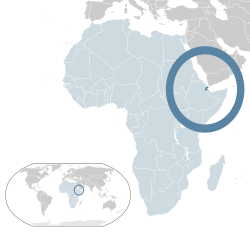Our website is made possible by displaying online advertisements to our visitors.
Please consider supporting us by disabling your ad blocker.
Djibouti
Republic of Djibouti | |
|---|---|
| Motto: اتحاد، مساواة، سلام (Arabic) Unité, Égalité, Paix (French) Inkittiino, Qeedala, Wagari (Afar) Midnimo, Sinaan, Nabad (Somali) Unity, Equality, Peace | |
| Anthem: Djibouti | |
 Location of Djibouti (dark blue) – in Africa (light blue & dark grey) | |
 | |
| Capital and largest city | Djibouti 11°36′N 43°10′E / 11.600°N 43.167°E |
| Official languages | |
| Recognised national languages | [1] |
| Other languages | |
| Ethnic groups | |
| Religion | Sunni Islam |
| Demonym(s) | Djiboutians |
| Government | Unitary dominant-party presidential republic |
| Ismaïl Omar Guelleh | |
| Abdoulkader Kamil Mohamed | |
| Legislature | National Assembly |
| Independence | |
• from France | 27 June 1977 |
| Area | |
• Total | 23,200[1] km2 (9,000 sq mi)[1] (146th) |
• Water (%) | 0.09 (20 km² / 7.7 sq mi) |
| Population | |
• 2020 estimate | 921,804 |
• Density | 37.2/km2 (96.3/sq mi) (168th) |
| GDP (PPP) | 2018 estimate |
• Total | $3.974 billion[2] |
• Per capita | $3,788[2] |
| GDP (nominal) | 2018 estimate |
• Total | $2.187 billion[2] |
• Per capita | $2,084[2] |
| Gini (2015) | 40.0[3] medium |
| HDI (2018) | low · 171st |
| Currency | Djiboutian franc (DJF) |
| Time zone | UTC+3 (EAT) |
| Driving side | right |
| Calling code | +253 |
| ISO 3166 code | DJ |
| Internet TLD | .dj |
Djibouti (officially called the Republic of Djibouti) is a country on the eastern coast of Africa. The capital city is also called Djibouti.
Djibouti gained its independence from France on June 27, 1977. The country was created out of the French Somaliland (later called the French Territory of the Afars and Issas), which was created in the 1800s as a result of French colonialism in Africa.
In 2020, about 920,000 people lived there. It is one of the least populous countries in Africa.[5] Two ethnic groups, the Somali and the Afar people, account for most of the people living in the country.
Djibouti joined the United Nations on September 20, 1977.[6][7] It is also a member of the Arab League, as well as the African Union and the Intergovernmental Authority on Development (IGAD).
- ↑ 1.0 1.1 1.2 1.3 "Djibouti". The World Factbook. CIA. 5 February 2013. Archived from the original on 2 July 2014. Retrieved 26 February 2013.
- ↑ 2.0 2.1 2.2 2.3 "Djibouti". International Monetary Fund.
- ↑ Selima., Jāhāna (2015). Human Development Report 2015: Work for Human Development (PDF). United Nations Development Programme. p. 232. ISBN 978-92-1-126398-5. OCLC 936070939. Archived (PDF) from the original on 22 December 2015. Retrieved 15 September 2018.
- ↑ "Human Development Report 2019". United Nations Development Programme. 10 December 2019. Archived from the original (PDF) on 10 May 2020. Retrieved 10 December 2019.
- ↑ "World Bank country data Djibouti (2009) (number rounded)". Data.worldbank.org. Retrieved 2011-04-27.
- ↑ "Today in Djibouti History". Historyorb.com. Retrieved 2011-04-27.
- ↑ "United Nations member states". Un.org. Retrieved 2011-04-27.
Previous Page Next Page




